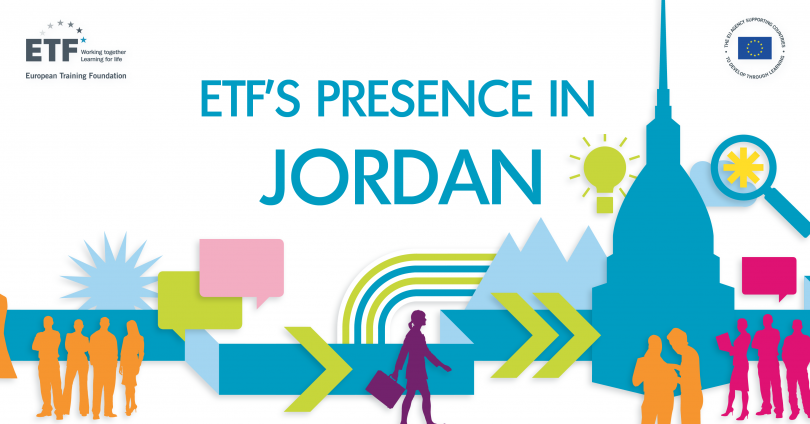
ETF's presence in Jordan
The ETF has been present in Jordan for over a decade and the implementation of the Torino Process has been a long-term undertaking which is yielding fruit. A smoothly functioning triangular relationship exists between the government, the European Union delegation and the European Bank for Reconstruction and Development (EBRD), all which communicate and cooperate with the ETF.
Although Jordan faces many challenges including a large influx of refugees from neighbouring countries, over half of the population below the age of 25, and within that age bracket an unemployment rate of over 35% (higher since the pandemic), a 2020 ETF study concluded that TVET is on track to become a dynamic and relevant segment of the human capital development system in the country.
Despite a serious political crisis last April and socio-economic challenges worsened by the covid pandemic, ETF’s country liaison for Jordan, Mounir Baati, said that the EU delegation has now started to focus on the quality of education within the TVET program following reforms. It is also providing support in conjunction with e-learning and blended learning which became essential during the pandemic when most schools and training centres closed. Ayman Alwreikat, the Jordanian government’s Torino Process coordinator and director of accreditation on TVET development said that during the pandemic the government was hard at work establishing Tadribak, an e-platform for distance training, now live.
The government is working on new bylaws to regulate the TVET sector in Jordan, said Alwreikat, who is additionally overseeing general and private accreditation of TVET programmes and classification of trainers.
The Torino Process, said Alwreikat, and ETF’s 2020 assessment report on Jordan helped identify areas where improvement is needed. Nine sector skills councils were established, he said, and the skills needed for the market will be studied. The sectors include chemicals, plastics, textiles, construction, agriculture, logistics, ICT, water and energy, tourism, and hospitality.
Mismatched skills are a big issue in Jordan where linking training programmes to the job market is essential. This is where Rami Samain, an inclusion policy specialist with the EBRD, steps in. “We focus on the skills mismatch gap,” said Samain, adding that the EBRD helps TVET institutions become familiar with the demand needed by the private sector.
A concrete example of the EBRD’s work is the creation of the Abdali Mall recruitment and training centre, where students, many of whom are young Syrian refugees, have access to a quality training programme tailored to the needs of the employers located within the mall.
During the covid pandemic, the tourism sector was severely affected and the EBRD investigated how employees could be upskilled and reskilled to fit into adjacent sectors where there was a need, for example training hotel employees to work in hospitals either dealing with logistics or health care.
The EBRD is also engaging with policy makers to help the TVET system, currently supply driven, to become demand driven. These days, says Samain, with governments that are saturated and can’t accommodate those seeking employment, for the private sector to be able to accommodate them, TVET needs to train students with the skills that are in demand. “This is when we plug into the Torino process,” said Samain. The EBRD benefits from the policy reform, and students benefit from economic inclusion, he said. The strategic relationship with ETF has been beneficial, he added, not only at a procedural level but also on an operational level.
The ETF has also been providing policy advice over the years to the delegation of the European Union to Jordan, which has now started to put in place the quality of TVET education as well as monitoring policy in general. Flexible, ad hoc input from the ETF has proven beneficial to the EU delegation, which is working on employability, connecting reforms in the TVET sector with the creation of job opportunities and other actions that have been implemented linked to the enhancement of the business climate. The delegation also recognises the need for a faster response to the Syrian refugee crisis in relation to TVET reforms, but this remains a work in progress.
ETF’s involvement in Jordan has been constant and long-term, says Mounir Baati. One of the Torino Process’ objectives is to develop the culture of collaborative evidence on policy, and in Jordan, this has largely has a positive impact.
Did you like this article? If you would like to be notified when new content like this is published, subscribe to receive our email alerts.